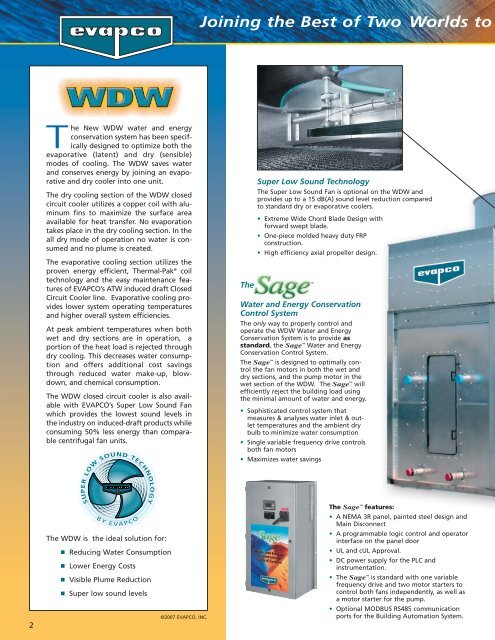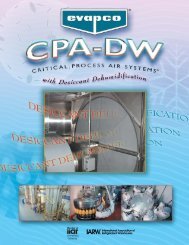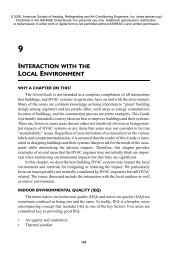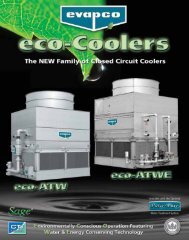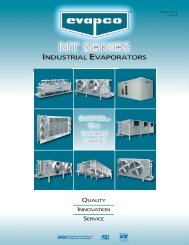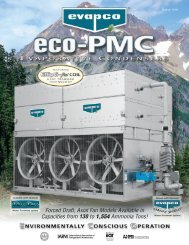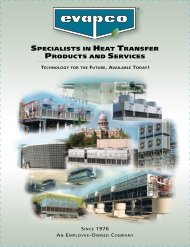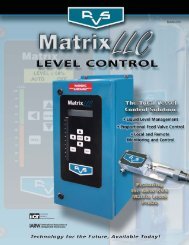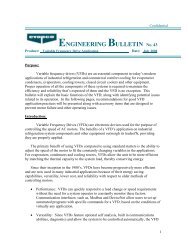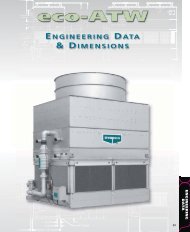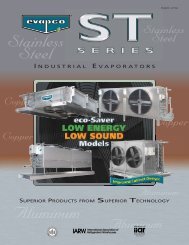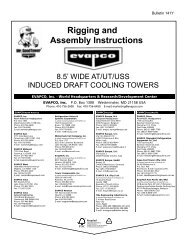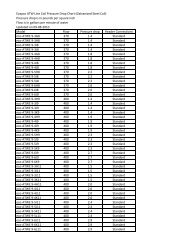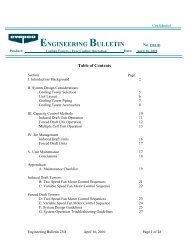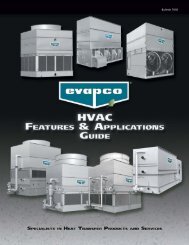WDW Product Brochure - Evapco
WDW Product Brochure - Evapco
WDW Product Brochure - Evapco
Create successful ePaper yourself
Turn your PDF publications into a flip-book with our unique Google optimized e-Paper software.
®<br />
Joining the Best of Two Worlds to<br />
The New <strong>WDW</strong> water and energy<br />
conservation system has been specifically<br />
designed to optimize both the<br />
evaporative (latent) and dry (sensible)<br />
modes of cooling. The <strong>WDW</strong> saves water<br />
and conserves energy by joining an evaporative<br />
and dry cooler into one unit.<br />
The dry cooling section of the <strong>WDW</strong> closed<br />
circuit cooler utilizes a copper coil with aluminum<br />
fins to maximize the surface area<br />
available for heat transfer. No evaporation<br />
takes place in the dry cooling section. In the<br />
all dry mode of operation no water is consumed<br />
and no plume is created.<br />
The evaporative cooling section utilizes the<br />
proven energy efficient, Thermal-Pak ® coil<br />
technology and the easy maintenance features<br />
of EVAPCO’s ATW induced draft Closed<br />
Circuit Cooler line. Evaporative cooling provides<br />
lower system operating temperatures<br />
and higher overall system efficiencies.<br />
At peak ambient temperatures when both<br />
wet and dry sections are in operation, a<br />
portion of the heat load is rejected through<br />
dry cooling. This decreases water consumption<br />
and offers additional cost savings<br />
through reduced water make-up, blowdown,<br />
and chemical consumption.<br />
The <strong>WDW</strong> closed circuit cooler is also available<br />
with EVAPCO’s Super Low Sound Fan<br />
which provides the lowest sound levels in<br />
the industry on induced-draft products while<br />
consuming 50% less energy than comparable<br />
centrifugal fan units.<br />
The<br />
Super Low Sound Technology<br />
The Super Low Sound Fan is optional on the <strong>WDW</strong> and<br />
provides up to a 15 dB(A) sound level reduction compared<br />
to standard dry or evaporative coolers.<br />
• Extreme Wide Chord Blade Design with<br />
forward swept blade.<br />
• One-piece molded heavy duty FRP<br />
construction.<br />
• High efficiency axial propeller design.<br />
Water and Energy Conservation<br />
Control System<br />
The only way to properly control and<br />
operate the <strong>WDW</strong> Water and Energy<br />
Conservation System is to provide as<br />
standard, the Sage Water and Energy<br />
Conservation Control System.<br />
The Sage is designed to optimally control<br />
the fan motors in both the wet and<br />
dry sections, and the pump motor in the<br />
wet section of the <strong>WDW</strong>. The Sage will<br />
efficiently reject the building load using<br />
the minimal amount of water and energy.<br />
• Sophisticated control system that<br />
measures & analyses water inlet & outlet<br />
temperatures and the ambient dry<br />
bulb to minimize water consumption<br />
• Single variable frequency drive controls<br />
both fan motors<br />
• Maximizes water savings<br />
<br />
2<br />
The <strong>WDW</strong> is the ideal solution for:<br />
Reducing Water Consumption<br />
Lower Energy Costs<br />
Visible Plume Reduction<br />
Super low sound levels<br />
©2007 EVAPCO, INC.<br />
The Sage features:<br />
• A NEMA 3R panel, painted steel design and<br />
Main Disconnect<br />
• A programmable logic control and operator<br />
interface on the panel door<br />
• UL and cUL Approval.<br />
• DC power supply for the PLC and<br />
instrumentation.<br />
• The Sage is standard with one variable<br />
frequency drive and two motor starters to<br />
control both fans independently, as well as<br />
a motor starter for the pump.<br />
• Optional MODBUS RS485 communication<br />
ports for the Building Automation System.


